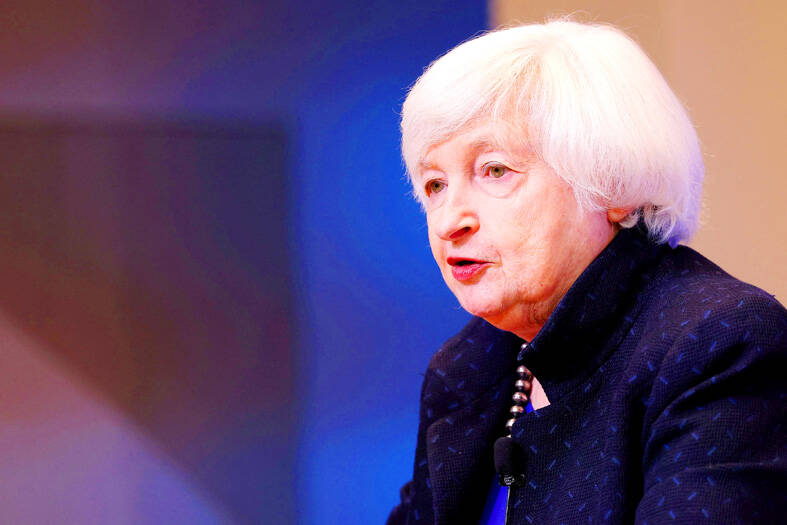US Secretary of the Treasury Janet Yellen in a letter sent to congressional leaders on Friday afternoon said her agency would need to start taking “extraordinary measures” or special accounting maneuvers intended to prevent the nation from hitting the debt ceiling as early as Jan. 14.
“Treasury expects to hit the statutory debt ceiling between January 14 and January 23,” Yellen wrote in a letter addressed to US House and Senate leadership, at which point extraordinary measures would be used to prevent the government from breaching the nation’s debt ceiling — which has been suspended until Wednesday.
The department has in the past deployed what are known as “extraordinary measures” or accounting maneuvers to keep the government operating. However, once those measures run out, the government risks defaulting on its debt unless lawmakers and the president agree to lift the limit on the US government’s ability to borrow.

Photo: Reuters
“I respectfully urge Congress to act to protect the full faith and credit of the United States,” she said.
The news comes after US President Joe Biden signed a bill into law last week that averted a government shutdown, but did not include US president-elect Donald Trump’s demand to raise or suspend the nation’s debt limit. The bill was approved by Congress only after fierce internal debate among Republicans over how to handle Trump’s demand.
“Anything else is a betrayal of our country,” Trump said in a statement.
After a protracted debate in the summer of last year over how to fund the government, policymakers crafted the Fiscal Responsibility Act, which included suspending the nation’s US$31.4 trillion borrowing authority until Jan. 1, 2025.
The US federal debt stands at roughly US$36 trillion — which ballooned across Republican and Democratic administrations. The spike in inflation after the COVID-19 pandemic pushed up government borrowing costs such that debt service next year would exceed spending on national security.
Republicans, who would have full control of the White House, House and Senate in the new year, have big plans to extend Trump’s 2017 tax cuts and other priorities, but debate over how to pay for them.

Sweeping policy changes under US Secretary of Health and Human Services Robert F. Kennedy Jr are having a chilling effect on vaccine makers as anti-vaccine rhetoric has turned into concrete changes in inoculation schedules and recommendations, investors and executives said. The administration of US President Donald Trump has in the past year upended vaccine recommendations, with the country last month ending its longstanding guidance that all children receive inoculations against flu, hepatitis A and other diseases. The unprecedented changes have led to diminished vaccine usage, hurt the investment case for some biotechs, and created a drag that would likely dent revenues and

Macronix International Co (旺宏), the world’s biggest NOR flash memory supplier, yesterday said it would spend NT$22 billion (US$699.1 million) on capacity expansion this year to increase its production of mid-to-low-density memory chips as the world’s major memorychip suppliers are phasing out the market. The company said its planned capital expenditures are about 11 times higher than the NT$1.8 billion it spent on new facilities and equipment last year. A majority of this year’s outlay would be allocated to step up capacity of multi-level cell (MLC) NAND flash memory chips, which are used in embedded multimedia cards (eMMC), a managed

CULPRITS: Factors that affected the slip included falling global crude oil prices, wait-and-see consumer attitudes due to US tariffs and a different Lunar New Year holiday schedule Taiwan’s retail sales ended a nine-year growth streak last year, slipping 0.2 percent from a year earlier as uncertainty over US tariff policies affected demand for durable goods, data released on Friday by the Ministry of Economic Affairs showed. Last year’s retail sales totaled NT$4.84 trillion (US$153.27 billion), down about NT$9.5 billion, or 0.2 percent, from 2024. Despite the decline, the figure was still the second-highest annual sales total on record. Ministry statistics department deputy head Chen Yu-fang (陳玉芳) said sales of cars, motorcycles and related products, which accounted for 17.4 percent of total retail rales last year, fell NT$68.1 billion, or

In the wake of strong global demand for AI applications, Taiwan’s export-oriented economy accelerated with the composite index of economic indicators flashing the first “red” light in December for one year, indicating the economy is in booming mode, the National Development Council (NDC) said yesterday. Moreover, the index of leading indicators, which gauges the potential state of the economy over the next six months, also moved higher in December amid growing optimism over the outlook, the NDC said. In December, the index of economic indicators rose one point from a month earlier to 38, at the lower end of the “red” light.